 Wheaton College has graduated several students who’ve eventually assumed the presidencies of schools and agencies. Less common is the fact that one Wheaton College teacher, Dr. C. Raymond Ludwigson, serving on staff as Associate Professor of Bible and Philosophy, departed its faculty to accept a college presidency; then, after a six year stint, returned to Wheaton College, resuming his teaching position. An alumnus of Moody Bible Institute and Wheaton College, Ludwigson earned his graduate degree from Chicago Lutheran Seminary and his doctorate from the University of Iowa. Dr. Ludwigson taught at Wheaton College until his appointment in 1949 to the presidency of Trinity College and Seminary in Chicago (now Trinity International University in Deerfield, IL). However, he returned to Wheaton College in September 1955. Throughout his teaching career and after he served as interim pastor at various churches, including Westminster Presbyterian Church in Elgin, IL. Ludwigson was known for a warm, devotional teaching style. He retired from Wheaton College in 1969 and in 1973 published A Survey of Bible Prophecy for Zondervan.
Wheaton College has graduated several students who’ve eventually assumed the presidencies of schools and agencies. Less common is the fact that one Wheaton College teacher, Dr. C. Raymond Ludwigson, serving on staff as Associate Professor of Bible and Philosophy, departed its faculty to accept a college presidency; then, after a six year stint, returned to Wheaton College, resuming his teaching position. An alumnus of Moody Bible Institute and Wheaton College, Ludwigson earned his graduate degree from Chicago Lutheran Seminary and his doctorate from the University of Iowa. Dr. Ludwigson taught at Wheaton College until his appointment in 1949 to the presidency of Trinity College and Seminary in Chicago (now Trinity International University in Deerfield, IL). However, he returned to Wheaton College in September 1955. Throughout his teaching career and after he served as interim pastor at various churches, including Westminster Presbyterian Church in Elgin, IL. Ludwigson was known for a warm, devotional teaching style. He retired from Wheaton College in 1969 and in 1973 published A Survey of Bible Prophecy for Zondervan.
All posts by admin
John Ortberg
In recent weeks Dr. John Ortberg addressed the Wheaton College graduates of both the undergraduate College and the Graduate School in the May 2010 Commencement ceremonies. In the following excerpts, he exhorts the Class of 2010 to embrace Wheaton’s mission, “For Christ and His Kingdom.”
It is His kingdom that we seek to be for, not ours. And this means a call to humility, because His kingdom is about something so much bigger, and so much more glorious, than our little evangelical subculture and institutions and movements and churches. But it’s also a call for great boldness, because to be ‘For Christ and His Kingdom’ means that we do not have to be nervous about this world. In a world where so much is down…where the economy is down…where employment is down…where consumer confidence is down…where marital stability is down…where, I know, the odds of finding a great job fresh out of college are down; people wonder is anything up? And some things are. The opportunity to serve a hurting world is up…the power of hope is up…the market for faith is up…and this is so because certain truths remain unchanged:
God remains sovereign…the beauty of forgiveness is still greater than the stain of sin…the Bible still pierces the human soul…prayer remains the most remarkable communication known to the human race…love still beats bigotry…joy still trumps despair…the greatest scandal of this sorry, dark world remains the scandal of the cross…God’s mercies are still new every morning…the tomb is still empty…the Spirit is still descending…the kingdom Jesus announced, which we seek to be for, is still expanding.
To be ‘For Christ and His Kingdom’ is to be for the world that God so loved that he gave His only begotten son.
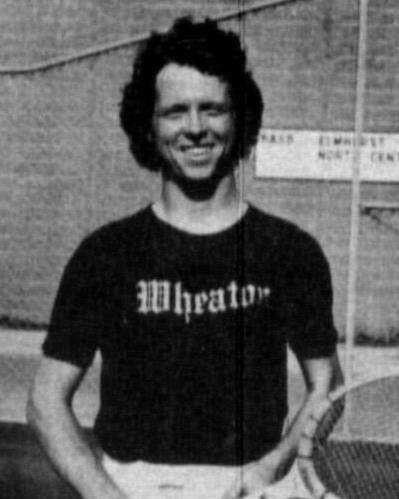 John Carl Ortberg, Jr. was born in 1957 and was raised in Rockford, Illinois. While attending Wheaton College in the late 1970s, Ortberg was a member of the Scholastic Honor Society and graduated summa cum laude in 1979 with a B.A. in psychology. He played men’s tennis all four years, earned the College Conference of Illinois and Wisconsin (CCIW) Most-Valuable Player award, achieved NCAA All-American Honors and reached the quarterfinals in men’s doubles at the NCAA Division III Tennis Championships. During 1978 and 1979 he was the #1 CCIW singles and doubles champion and ranked first in singles and doubles of the Wheaton squad while captain his senior year.
John Carl Ortberg, Jr. was born in 1957 and was raised in Rockford, Illinois. While attending Wheaton College in the late 1970s, Ortberg was a member of the Scholastic Honor Society and graduated summa cum laude in 1979 with a B.A. in psychology. He played men’s tennis all four years, earned the College Conference of Illinois and Wisconsin (CCIW) Most-Valuable Player award, achieved NCAA All-American Honors and reached the quarterfinals in men’s doubles at the NCAA Division III Tennis Championships. During 1978 and 1979 he was the #1 CCIW singles and doubles champion and ranked first in singles and doubles of the Wheaton squad while captain his senior year.
He pursued post-graduate studies at the University of Aberdeen in Scotland and later earned both an Master of Divinity (M.Div.) and a Doctorate (Ph.D.) in Clinical Psychology from Fuller Theological Seminary, where he is currently on the Board of Trustees.
He served as senior pastor at Simi Valley Community Church for five years until 1990, and then until 1994 at Horizons Community Church in Diamond Bar, CA. The Ortbergs moved from California to Illinois for John and his wife, Nancy to serve as teaching pastors at Willow Creek Community Church in South Barrington, Illinois for the next decade.
While living in the Chicagoland area, in March 1997 John and Nancy gave the McManis Lectureship Chapel “Recovering an Evangelical Spirituality” on the campus of Wheaton College.
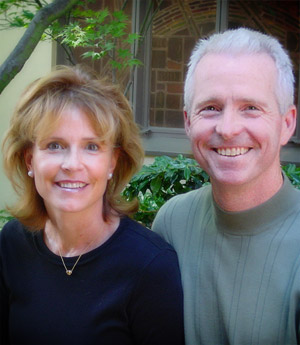 Since 2003 he has served as Senior Pastor of the 4,000 member Menlo Park Presbyterian Church in California. Ortberg is also an author of such Zondervan titles as the 2002 Christianity Today Book Award winner If You Want to Walk on Water, You’ve Got to Get Out of the Boat (2001) and the 2008 ECPA Christian Book Award winner When the Game is Over, It All Goes Back in the Box.
Since 2003 he has served as Senior Pastor of the 4,000 member Menlo Park Presbyterian Church in California. Ortberg is also an author of such Zondervan titles as the 2002 Christianity Today Book Award winner If You Want to Walk on Water, You’ve Got to Get Out of the Boat (2001) and the 2008 ECPA Christian Book Award winner When the Game is Over, It All Goes Back in the Box.
In January 2007 Pastor Ortberg returned to Wheaton and addressed the campus for Spring Special Services in a series of messages entitled “Adventures in Faith.” His pastorate at Menlo Park was also highlighted along with other alumni in the Wheaton Magazine (Winter 2007) issue.
The Ortbergs have three children (Laura, Mallory and John) and live in Menlo Park, CA.
Angel Fall
It was the stillness. That’s what they remembered most about the beginning. A stillness that hung like ancient mold in the trees. But who could forget anything about Wind Sunday? The sharp acrylic memories painted themselves on their hearts and refused to dry. And ever after, touching the canvas brought tears…
An airliner crashes into the ocean and only three young people survive. For the Lancaster siblings, the strangest storm in history becomes a portal to an ancient world ruled by seven evil creatures of immense power. As the children descend into the terror and temptation of Boreth, every choice takes them closer to endless night. With dark, glistening strands from Lewis, Lovecraft, and Tolkien, the cloth of Angel Fall has been woven. But the journey it weaves is not just for Alex, Amanda, and Tori…it is for all those who cannot find their way home.
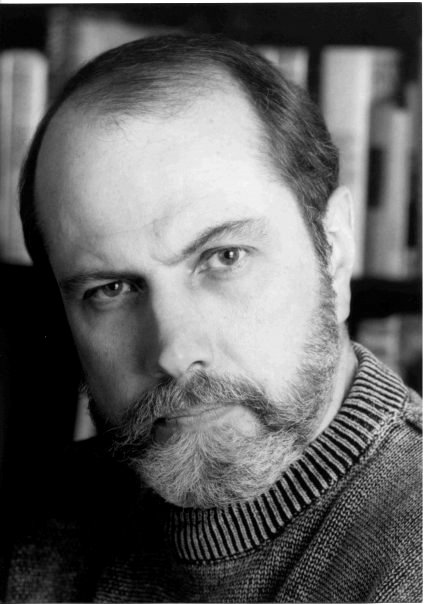 Hollywood screenwriter, executive producer, and Special Collections author, Coleman Luck recently finished the above novel after twenty-five years of labor. Preliminary drafts of his work entitled Wind Sunday are available in the Coleman Luck Papers. “Early in his Hollywood career, Coleman began writing a novel to entertain himself and his family. Over the years whenever he had a few months free he would take it out and work on it. Sadly there were many busy years in which he wasn’t able to work on it at all. Consequently his children grew up with a half-finished story stuck in their memories. The new century arrived and some close friends came to visit. Coleman read the unfinished manuscript to them and their children. The children encouraged him to finish writing it promising that if he didn’t they would grow up, come back and kill him. With his own children and a new set of children goading him on, the novel was finished and became Angel Fall.” *
Hollywood screenwriter, executive producer, and Special Collections author, Coleman Luck recently finished the above novel after twenty-five years of labor. Preliminary drafts of his work entitled Wind Sunday are available in the Coleman Luck Papers. “Early in his Hollywood career, Coleman began writing a novel to entertain himself and his family. Over the years whenever he had a few months free he would take it out and work on it. Sadly there were many busy years in which he wasn’t able to work on it at all. Consequently his children grew up with a half-finished story stuck in their memories. The new century arrived and some close friends came to visit. Coleman read the unfinished manuscript to them and their children. The children encouraged him to finish writing it promising that if he didn’t they would grow up, come back and kill him. With his own children and a new set of children goading him on, the novel was finished and became Angel Fall.” *
* Excerpted from Coleman Luck’s biography.
Saint Nicholas
Buswell Library is certainly familiar to staff and students of Wheaton College, but it is relatively unknown that the structure to which it is attached was originally called the Nicholas Building, until expanded in the late 1970s. A portrait and a plaque, until removal in 2006, commemorated the contributions of a man named Robert E. Nicholas.
He was born oldest of eight children on a farm in 1882 in Caledonia, Ontario, Canada. “The village declared no holiday,” he writes, “the whistles did not blow, nor did the church bells ring when it became known that I had made my appearance in a world which already had problems enough.”
Raised among believing Methodist parents, Nicholas early learned the value of hard work as he milked cows, drove horses and plowed soil. After graduating from business college, he visited with an uncle who had attended the 1893 Chicago World Fair. Uncle William confidently stated, “There are a hundred ways of making a living in Chicago.” So Nicholas decided to discover one for himself. Meeting cousins living in the Windy City, Nicholas toured the Art Institute, the Stockyards and the Public Library, accompanied by a warning to avoid the red light district. Eventually he and his friend, George Rogers, using borrowed capital, started a hardware business in Oak Park, Illinois, a small town promising big returns. During this period Nicholas roomed in the home of A.T. Hemingway, General Secretary of the Chicago YMCA and grandfather of Ernest, the novelist. (The attending physician at the birth of Nicholas’ first child was Dr. Clarence Hemingway, Ernest’s father). Nicholas’ store specialized in builders’ hardware for commercial development, and soon he and Rogers enjoyed a sterling reputation among Chicago’s architects and contractors. Nicholas was also instrumental in attracting Loop department stores to establish satellites in Oak Park.
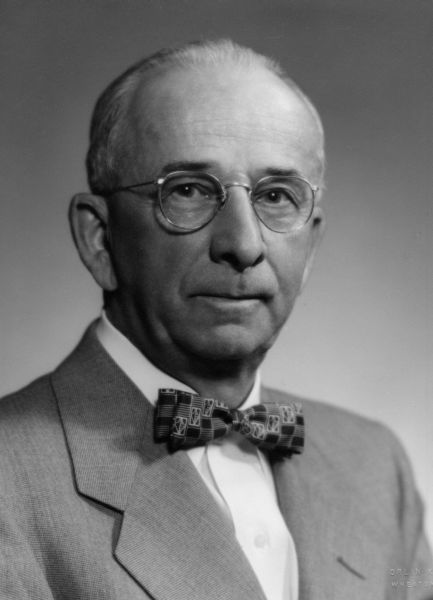 In addition to local commerce, he influenced community life as a member of the Christian Businessmen’s Committee for Chicago, successfully barring Sunday movies from Oak Park. In 1928 he was invited by Dr. James M. Gray, President of Moody Bible Institute, to join the Board of Trustees of MBI. He was elected, and soon became a member of the Executive and Investment committees. One year later he sold his business to pursue other enterprises, while also joining the Wheaton College Board of Reference. In 1932 he was elected to the Board of Trustees, replacing Fleming H. Revell, D.L. Moody’s brother-in-law, serving as vice-chairmen of the board under Herman A. Fischer. Combining wealth with consecration, Nicholas generously donated funds, usually anonymously, to churches, philanthropic activities and mission agencies. He remarks in his 1962 memoir, Life Has Been Good:
In addition to local commerce, he influenced community life as a member of the Christian Businessmen’s Committee for Chicago, successfully barring Sunday movies from Oak Park. In 1928 he was invited by Dr. James M. Gray, President of Moody Bible Institute, to join the Board of Trustees of MBI. He was elected, and soon became a member of the Executive and Investment committees. One year later he sold his business to pursue other enterprises, while also joining the Wheaton College Board of Reference. In 1932 he was elected to the Board of Trustees, replacing Fleming H. Revell, D.L. Moody’s brother-in-law, serving as vice-chairmen of the board under Herman A. Fischer. Combining wealth with consecration, Nicholas generously donated funds, usually anonymously, to churches, philanthropic activities and mission agencies. He remarks in his 1962 memoir, Life Has Been Good:
Indeed, I consider among the most rewarding experiences of my life, my association with the presidents, trustees and staff of Wheaton College and Moody Bible Institute. The fine men who comprise the trustee boards and give so freely of their time and means are an inspiration and a blessing. Their leadership, devotion and counsel given in a Christian spirit with independence of viewpoint, but without contention, could well be an example for other Christian organizations. The president of Moody Bible Institute, Dr. William Culbertson, and the president of Wheaton College, Dr. V.R. Edman, are two of the finest men it has been my privilege to know, and my own life has been enriched by working with them. No one could serve actively on the Trustee Boards of Moody Bible Institute and Wheaton College without realizing that the students for whom these institutions are maintained are among the finest in the land.
Nicholas entered unexpected and invigorating spiritual heights when on a Sunday evening his train stalled in Minneapolis. Seeking a church, he wandered downtown until he passed First Baptist, pastored by Dr. W.B. Riley. Stepping in, Nicholas heard the powerful preacher expound on the Second Coming, about which Nicholas knew little. But it was just what he needed. “I realized how hungry I was to hear about the return of the Lord Jesus, now that I had dedicated my life fully to him.”
Dr. Edman devotes to Nicholas a chapter called “The Satisfying Life” in They Found the Secret: Twenty Transformed Lives that Reveal a Touch of Eternity, an examination into the spiritual crisis experienced by prominent Christian men and women. He quotes Nicholas:
By this experience, and by others which have followed, my life has been changed from that of a nominal Christian to one with purpose and convictions. There has been an abiding sense of the Holy Spirit’s presence in my life. He has given me an appetite for the things of God and an appreciation of the Scriptures. In answer to prayer he has given me ability in business, strength under strain, confidence and courage can understand why so many Christians do not have the joy they might have, or do not have overflowing praise in their heart…There must be a full surrender of life to the Savior to have the fullness of the Holy Spirit…
Recognizing his dedicated service, Wheaton College conferred on Robert E. Nicholas an honorary doctorate in 1963, and in 1967 re-named its library, of which he had originally paid all construction costs, after him. He and his wife, Mabel, raised three sons and one daughter. Still appreciative of his good life, he died at 94 in 1977.
Change of Heart
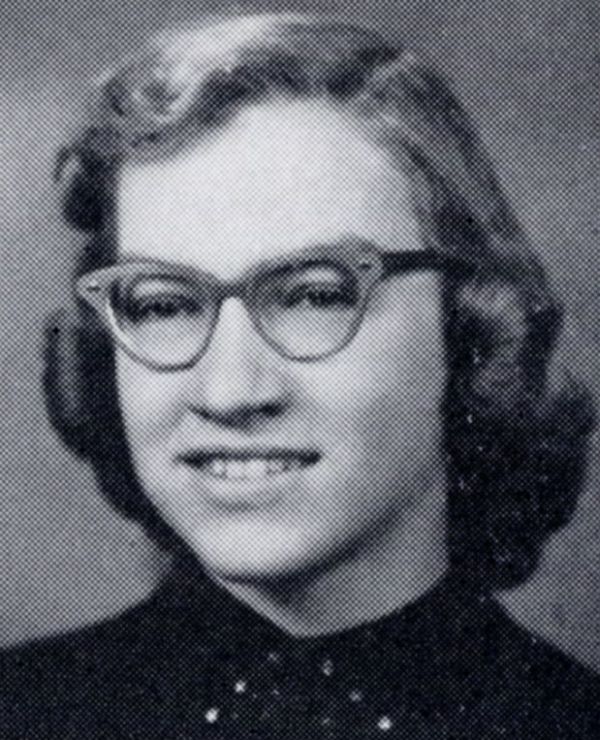 “Although I am an older person,” begins Doris Dresselhaus Menzies in her memoir, Young At Heart (2007), “I have a much younger heart.” She explains her cryptic remark as the story unfolds.
“Although I am an older person,” begins Doris Dresselhaus Menzies in her memoir, Young At Heart (2007), “I have a much younger heart.” She explains her cryptic remark as the story unfolds.
Born in Decorah, Iowa, in 1932, Doris lived peacefully with her family and worked hard on the farm. At age nine she fully committed to Christ at the local Assemblies of God church. She was baptized in a lake, and shortly thereafter during an evening service received her baptism in the Holy Spirit. In 1951 she enrolled at Wheaton College where she studied elementary education. Because there were no Pentecostal churches in Wheaton at that time, an Assemblies of God campus fellowship provided a venue where Doris could meet students of similar conviction, including her future husband, William Menzies. “Neither of us could imagine the adventures in faith that would be ours when we met at Wheaton College,” he reflects. Later Bill would pen Anointed to Serve (1984), the definitive history of the Assemblies of God.
After their marriage in 1955, Bill and Doris served in various midwestern churches until he was called to teach at Central Bible College in Springfield, Missouri. From there he moved to other teaching positions at home and abroad, until he and Doris were called to be regular missionaries for the Assemblies of God. In 1989 they relocated to the Philippines, where Bill served as president of Asia Pacific Theological Seminary. As he taught and lectured at the school, Doris quietly mingled with the people of Baguio City, personally leading many hungry hearts to Christ. Their lives proceeded busily until one day Doris suffered sharp chest pains, indicating severe cardiac arrest. Transferred to Salt Lake City for specialized care, it was concluded that she required a heart transplant. With that stunning report came the additional bad news that she would need to await a donor. And so for fourteen months she and Bill patiently waited in Salt Lake, until at last it was announced that a heart had been located, belonging to a young man from Oregon who requested that his organs be donated should anything happen to him. 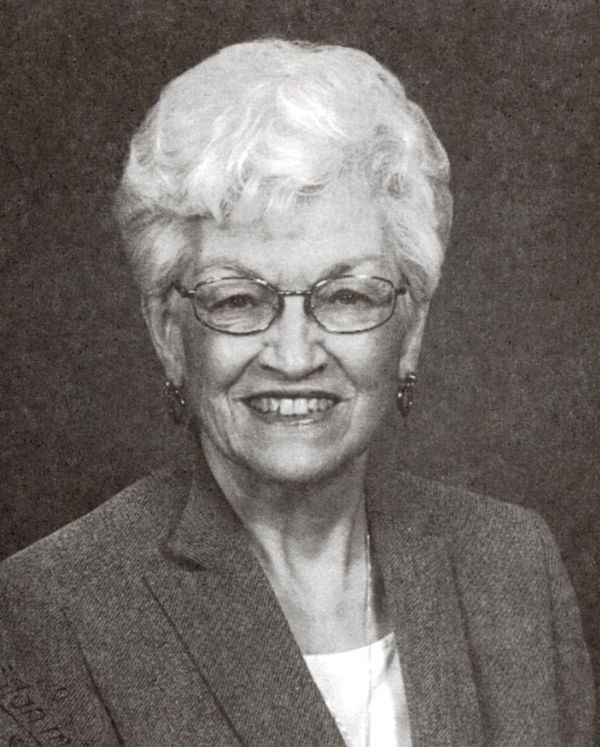 To the delight of all, the operation was a smashing success. As she writes, “There was thanksgiving and joy in my new heart.”
To the delight of all, the operation was a smashing success. As she writes, “There was thanksgiving and joy in my new heart.”
But Doris was not entirely free of physical affliction. In 2003 she was diagnosed with lymphoma cancer. After an onerous series of chemo and radiation treatments, she lost her strength, appetite and all her hair, but the disease was finally controlled. Her hair has since regrown, and she has regained the weight.
Summing up her eventful life, Doris Menzies expresses her joy: “I have appointments to see my oncology doctor, and also blood tests to send to my heart transplant doctor…I also see my internist, my neurologist, and my foot doctor on a regular basis. But my Great Physician continues to be God Almighty, my Creator and Redeemer. To Him I give all glory for each day!”
May the Mind of Christ My Savior
Dr. Hudson T. Armerding’s A Word to the Wise (Tyndale 1980) was published to bring wisdom and encouragement to fellow Christians everywhere. In the following excerpt he shares some of the wisdom gathered over fifteen years as college president:
Singing hymns together has long been traditional for both congregation and graduates at the annual Baccalaureate Service of Wheaton College. However, in 1968 the printed program carried the words of the beautiful hymn written by Kate B. Wilkinson entitled “May the Mind of Christ My Savior.” Then serving in his third year as president of the college, Dr. Hudson T. Armerding selected this hymn because of the meaningful content of its words for all committed believers –but particularly for young people, who have so much potential. Every year since then, with concurrence by the officers of each graduating class, this hymn has appeared in the printed program for the [Commencement Services]…These are the words that have stirred the hearts of many on those occasions…
May the mind of Christ, my Savior,
Live in me from day to day,
By His love and pow’r controlling
All I do and say.
May the Word of God dwell richly
In my heart from hour to hour,
So that all may see I triumph
Only through His pow’r.
May the peace of God, my Father,
Rule my life in everything,
That I may he calm to comfort
Sick and sorrowing.
May the love of Jesus fill me,
As the waters fill the sea;
Him exalting, self abasing,
This is victory.
May I run the race before me,
Strong and brave to face the foe,
Looking only unto Jesus
As I onward go.
May His beauty rest upon me
As I seek the lost to win,
And may they forget the channel,
Seeing only Him. Amen.
Mortimer to the rescue…
 The visitor to the second floor of Buswell Memorial Library will spy a sign near the drinking fountain designating an alcove in a short hallway as “Mortimer B. Lane.” Cornered in the quiet byway are the offices of retired professors Gerald Hawthorne and Beatrice Batson. However, before Lane was a place he was a person, hired in 1937 to teach political science and economics. An admirable instructor, he enjoyed relationships beyond the classroom. Dr. Joseph MacKnight (’43) fondly remembers in an oral interview when Lane and his wife, Mary, opened their spacious dining room every Sunday evening, serving cold meats and refreshments to Wheaton College students strolling home from church. MacKnight’s classmate, Billy Graham, also recalls:
The visitor to the second floor of Buswell Memorial Library will spy a sign near the drinking fountain designating an alcove in a short hallway as “Mortimer B. Lane.” Cornered in the quiet byway are the offices of retired professors Gerald Hawthorne and Beatrice Batson. However, before Lane was a place he was a person, hired in 1937 to teach political science and economics. An admirable instructor, he enjoyed relationships beyond the classroom. Dr. Joseph MacKnight (’43) fondly remembers in an oral interview when Lane and his wife, Mary, opened their spacious dining room every Sunday evening, serving cold meats and refreshments to Wheaton College students strolling home from church. MacKnight’s classmate, Billy Graham, also recalls:
As for my homesickness, the Lane family soon came to my rescue. Dr. Mortimer B. Lane taught courses in government and economics at the college. Before that, when he was in government service, he and his wife and their seven children lived in Switzerland. Quite well-off, they entertained students in their large, comfortable Victorian home near the campus. They welcomed me as one of their own. Early on Sunday mornings, as Plymouth Brethren, they hosted a small local assembly in their house. I began to attend that quiet communion service with students from other churches.
As a Brethren adherent accustomed to restrained worship, Lane sent a friendly letter in 1939 to then-president Dr. J. Oliver Buswell, requesting that certain matters be observed during chapel services. Specifically, he objected to 1) prize giving; 2) concerts, unless dedicated to sacred music; 3) frivolous announcements; and 4) clapping. As well, he disliked the presence of “aesthetic decorations” such as candles, widely used by literary societies, since these trappings are used by the Roman Catholic Church to “appeal to the senses instead of to the mind and heart.” Buswell offers a sensible response:
My own background leads me to enjoy the worship atmosphere of a Gospel tabernacle type of meeting in which enthusiastic music, occasional handclapping, and a good many other informal things have a part in worship. I also enjoy the dignified Protestant service of the old orthodox churches in which a considerable amount of art is employed. I think the aesthetic appeal of music and art cannot correctly be set in antithesis to an appeal to the soul, but may correctly be characterized as an appeal to the soul through the musical and artistic sense the Lord has given us.
Celebrating a fruitful 14-year season of mentoring and hospitality, Mortimer B. Lane resigned in 1951 and relocated with his family to Long Beach, Mississippi. Here they opened “Southern States Bible and Christian Supplies,” selling and distributing scripture, Sunday School material, hymnbooks and recordings. Responding to Lane’s departure, Dr. Edman, fourth president of Wheaton College, expressed “deep regret” but also “…sincere appreciation for all that you and your lovely family have meant to us…You have been a pillar of strength to me personally and to all the College, a source of joy and encouragement to many young hearts, especially to those who have come from distant parts of the world.” As a parting gift, Edman and the faculty presented him with a letter case to use for his business. “I don’t need it to remember my associates at Wheaton,” Lane gratefully replies, “but this will make me remember all the more.”
Lane’s Plymouth Brethren assembly, for which he served as an elder, evolved into what is now called Bethany Chapel, situated on the corner of President St. and College Ave. in Wheaton, Illinois. His son, James, later served on the Wheaton College board of trustees.
Samuel Richey Kamm
Each year the campus hosts the Kamm Lecture, a lecture series that dates back nearly three decades and is named after Dr. S. Richey Kamm, a Wheaton College Professor of History, Political Science, and Social Science. For over thirty years, Kamm had a remarkable impact on the lives of many undergraduates. As a teacher of political theory and constitutional history, he stimulated interest in public affairs and encouraged the study and practice of the law. To honor the legacy of this outstanding professor, friends and former students created the Kamm Memorial Fund to support lectures and law-related symposia on campus. Each year the endowed lecture is given on a subject related to jurisprudence by a prominent scholar or practitioner in the legal field. The first annual Kamm Memorial Symposium was held on May 1-2, 1975.
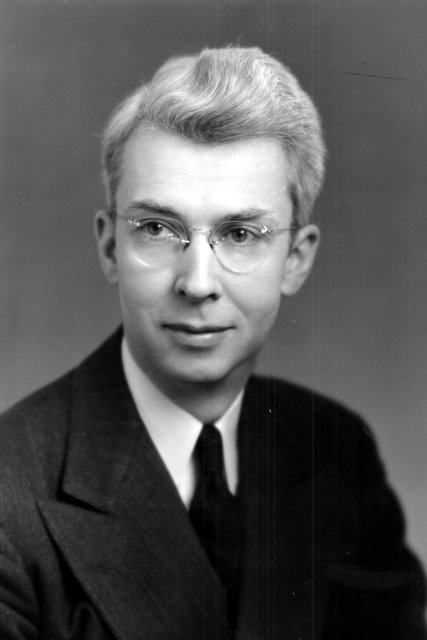 Samuel Richey Kamm was born in Whitewater, Wisconsin, on July 12, 1903, and grew up in Montfort. He graduated cum laude from Greenville College in 1925 with a major in History and minors in Biology and Greek. Upon graduating, he embarked on his teaching career which would last until he died in 1973. The institutions at which he taught before going to Wheaton were Wessington Springs Junior College (South Dakota), Seattle Pacific College (Washington), Monmouth Junior College (New Jersey), and Haddon Heights High School (New Jersey). While teaching, Dr. Kamm earned an M.A. in History from the University of Michigan and a Ph.D. in American History from the University of Pennsylvania, receiving that honor in 1939. His dissertation entitled, “The Civil War Career of Thomas A. Scott, Vice-President of the Pennsylvania Railroad,” is one illustration of his lifelong interest in railroads.
Samuel Richey Kamm was born in Whitewater, Wisconsin, on July 12, 1903, and grew up in Montfort. He graduated cum laude from Greenville College in 1925 with a major in History and minors in Biology and Greek. Upon graduating, he embarked on his teaching career which would last until he died in 1973. The institutions at which he taught before going to Wheaton were Wessington Springs Junior College (South Dakota), Seattle Pacific College (Washington), Monmouth Junior College (New Jersey), and Haddon Heights High School (New Jersey). While teaching, Dr. Kamm earned an M.A. in History from the University of Michigan and a Ph.D. in American History from the University of Pennsylvania, receiving that honor in 1939. His dissertation entitled, “The Civil War Career of Thomas A. Scott, Vice-President of the Pennsylvania Railroad,” is one illustration of his lifelong interest in railroads.
In 1940, Dr. Kamm began teaching at Wheaton College. By 1943, he had advanced from Assistant Professor to full Professor. His major interest was teaching, especially in Constitutional and Diplomatic American history, but he also found time for numerous other involvements both on and off campus. He was an active member of the Commission on Social Action of the National Association of Evangelicals, and he served as Public School Board President. On campus he served on many committees, among them Educational Policies and Curriculum, and Centennial Historical Projects.
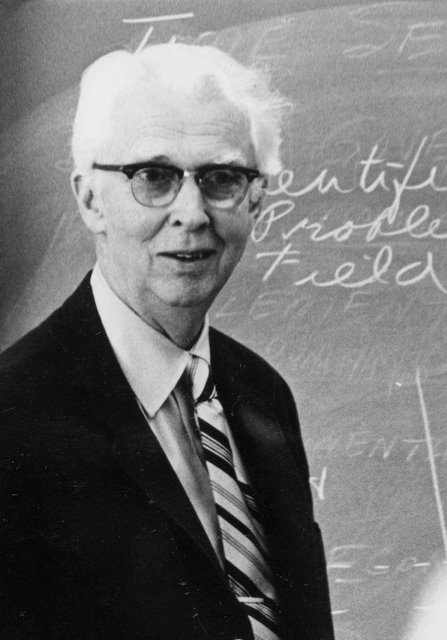 During the 1959-1960 year, Dr. Kamm had the opportunity to be a Fulbright lecturer in Dacca, East Pakistan (Bangladesh). He had the distinguished honor of inaugurating a course in American History at Whitworth College, Seattle Pacific College, and Greenville College. His recognition beyond Wheaton was evidenced by honorary degrees from Greenvile, Seattle Pacific and Whitworth Colleges. He retired from the Wheaton College faculty in May 1973. He was in route to Westmont College (California) to take up duties as a guest professor when he died of a heart attack on August 29, 1973.
During the 1959-1960 year, Dr. Kamm had the opportunity to be a Fulbright lecturer in Dacca, East Pakistan (Bangladesh). He had the distinguished honor of inaugurating a course in American History at Whitworth College, Seattle Pacific College, and Greenville College. His recognition beyond Wheaton was evidenced by honorary degrees from Greenvile, Seattle Pacific and Whitworth Colleges. He retired from the Wheaton College faculty in May 1973. He was in route to Westmont College (California) to take up duties as a guest professor when he died of a heart attack on August 29, 1973.
Many things can be said of Dr. Kamm. He was an outstanding speaker, a brilliant scholar, and dedicated to all he undertook. Moreover, Dr. Kamm was a favorite classroom teacher and a well-loved man. He inspired many students to combine Christianity with their vocation, and many went into the government service with that in mind. Perhaps the highest tribute can be made by repeating what one of Dr. Kamm’s friends said when he died…
He was one of God’s gentlemen, a rare Christian who fused graciousness and scholarship in a beautiful way.
The Samuel Richey Kamm Papers detail the life and thirty-four year career of a Wheaton College Professor of History, Political Science, and Social Science. The collection also shows his work as a member of the local public school board, which he served as president. The papers are categorized according to biographical, professional and civic involvement. The professional material covers various workshops, committees, seminars and departmental/institutional matters, in addition to material relating to the City of Wheaton and the history of Illinois. Hundreds of file cards, featuring a vast array of research topics such as history, political science, culture, bibliographies, foreign affairs and education, are contained in five boxes and one small metal cabinet. They are available to researchers in the Wheaton College (IL) Archives & Special Collections.
The Serialized Adventures of Roy J. Snell
Certain writers are famous for one book, such as Harper Lee and To Kill a Mockingbird or Margaret Mitchell and Gone with the Wind. Others generate saleable wordage as easily as sneezing. For instance, Erle Stanley Gardner, creator of unbeatable lawyer Perry Mason, positioned multiple typewriters around his office and simply switched from one manuscript to another. His colleague, English crime novelist John Creasey, wrote 562 novels; and Barbara Cartland published an astonishing 723 Regency romances, aside from several non-fiction titles.
In the world of juvenile fiction, Roy J. Snell wrote somewhat less but lived as large, trekking as hazardously as Ernest Hemingway or Jack London. “Did you ever eat walrus meat?” asked advertisements for Snell’s books. “Did you ever drive a dog team, travel in a boat made of skins, or sleep in a bag?” Gosh, no! replied generations of wide-eyed boys and girls starved for vicarious thrills. But Snell did all this and more, tackling perilous frontiers – deserts, seas and tropics – with gusto and humor. Born in 1880 at Laddonia, Missouri, he moved with his family to northern Illinois where he worked his way through Wheaton Academy and Wheaton College. Graduating in 1906, he enrolled for one year at Harvard Divinity School, then matriculated to Chicago Theological seminary, leaving with his degree in 1916. He received his MA from the University of Chicago in 1917. Moving south he served first as pastor of a small church in rural Illinois, then as principal of the Black Mountain Academy in Evarts, Kentucky, living among the feuding families of the hills. As a missionary he relocated to the Behring Straits, Alaska, where he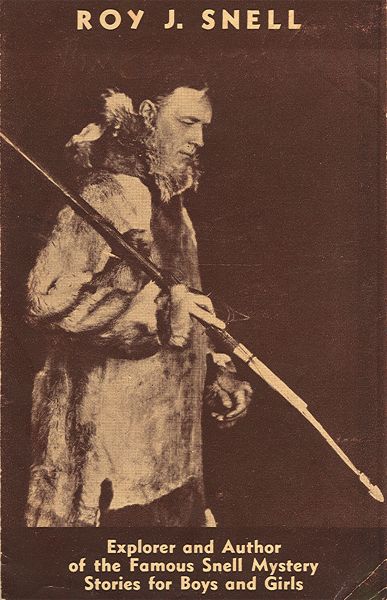 rode herd, directing 350 Eskimos and 1500 Wales reindeer. At one point he sailed the Arctic Ocean in a boat made of skins. Desiring to write the Great American Novel, Snell settled for adventure and mystery tales, drawing from his vast storehouse of experience. His work began rolling from the presses at breakneck speed as he often composed 2000 words per hour without an outline. He sold his first manuscript, Little White Fox and His Arctic Friends, in 1916. Many of his novels were first serialized in Boy’s Life, American Boy and The Youth’s Companion. During WW I he spent six months in France with the YMCA, serving as a mechanic. Here he met missionary Lucille Ziegler, whom he married in 1920. During their honeymoon he wrote a book. After the war Snell returned to Wheaton, residing with his family at 705 N. Wheaton Ave. For 20 years during the holidays he worked incognito at Marshall Field’s and Carson’s in Chicago, hand-selling his own titles over-the-counter to unsuspecting customers. Further bolstering book and magazine sales, he lectured annually in Detroit schools about Eskimo ways, struggling into a deerskin parka while demonstrating how to throw harpoons, or how to catch a tame monkey gone wild. “A pan of glue is substituted for water,” he explained. “Mr. Monk washes his face with glue. His eyes are stuck fast together and he is easily caught.”
rode herd, directing 350 Eskimos and 1500 Wales reindeer. At one point he sailed the Arctic Ocean in a boat made of skins. Desiring to write the Great American Novel, Snell settled for adventure and mystery tales, drawing from his vast storehouse of experience. His work began rolling from the presses at breakneck speed as he often composed 2000 words per hour without an outline. He sold his first manuscript, Little White Fox and His Arctic Friends, in 1916. Many of his novels were first serialized in Boy’s Life, American Boy and The Youth’s Companion. During WW I he spent six months in France with the YMCA, serving as a mechanic. Here he met missionary Lucille Ziegler, whom he married in 1920. During their honeymoon he wrote a book. After the war Snell returned to Wheaton, residing with his family at 705 N. Wheaton Ave. For 20 years during the holidays he worked incognito at Marshall Field’s and Carson’s in Chicago, hand-selling his own titles over-the-counter to unsuspecting customers. Further bolstering book and magazine sales, he lectured annually in Detroit schools about Eskimo ways, struggling into a deerskin parka while demonstrating how to throw harpoons, or how to catch a tame monkey gone wild. “A pan of glue is substituted for water,” he explained. “Mr. Monk washes his face with glue. His eyes are stuck fast together and he is easily caught.”
By the end of his life Snell had published 82 novels, with over two million sold. “I also wrote something like a thousand Sunday School stories for the David C. Cook Pub. Co. of Elgin,” he matter-of-factly informs the Wheaton College Alumni Association in a 1959 update. Later that year he suffered chest pains and was taken to DuPage Memorial Hospital in Elmhurst. Four days later his earthly odyssey ended. “I’ve had my day,” Snell once told a reporter, “and got out of it exactly what I wanted.” He was survived by his wife and three sons.
Frank Dyrness
On March 22, 2010, Dr. Nicholas Perrin, Associate Professor of New Testament, gave his inaugural lecture as holder of the Franklin S. Dyrness Chair of Biblical Studies entitled “The Bible from Westminster to Muenster: The Interface between Theological Confession and Free Historical Inquiry.” Dr. Perrin holds degrees from The Johns Hopkins University (B.A. 1986), Covenant Theological Seminary (M.Div. 1994), and Marquette University (Ph.D. 2001). His dissertation was “Thomas and Tatian: The Relationship between the Gospel of Thomas and the Diatessaron.”
 The history of the Franklin Dyrness Chair dates back nearly a quarter-century to 1987 when the Class of ’27 alumnus and founder of the Quarryville Presbyterian Retirement Community contributed funds toward an endowed chair of biblical studies. C. Hassell Bullock was named the first distinguished chair until his retirement in 2009 after thirty-six years as Professor of Old Testament.
The history of the Franklin Dyrness Chair dates back nearly a quarter-century to 1987 when the Class of ’27 alumnus and founder of the Quarryville Presbyterian Retirement Community contributed funds toward an endowed chair of biblical studies. C. Hassell Bullock was named the first distinguished chair until his retirement in 2009 after thirty-six years as Professor of Old Testament.
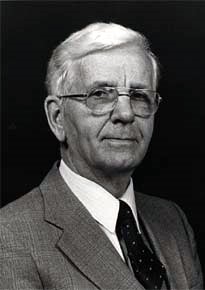 Franklin Seth Dyrness was born May 16, 1905 in Chicago, Illinois to Norwegian-born parents who immigrated to the United States. He attended Wheaton College was president of the Beltionian Literary Society, junior class president and played football; he graduated in 1927. He briefly taught science at the Wheaton Academy and was married to fellow classmate, Dorothy Rasmussen in 1931. They would eventually raise five children. Dyrness also graduated from Westminster Theological Seminary in 1931 and pastored the Chestnut Level Presbyterian Church in Quarryville, PA through 1936. He was then installed as the first pastor of an independent Presbyterian Church in later to become Faith Orthodox Presbyterian Church, and then as Faith Reformed Presbyterian Church. He served as pastor for twenty-six years until 1963. Under this pastorate the church helped organize the Quarryville Bible Conference Association for the purpose of organizing summer camps and conferences for all ages. Dyrness served as its president for five years, and executive director for thirty-seven years. In 1948, he and a group of associates founded the Quarryville Presbyterian Home. Franklin held the position of president from 1948 until he retired in December 1985 at eighty-one years old. His honors include election to the Wheaton College Honor Society and the conferring of the degree Doctor of Divinity by Wheaton in its centennial year of 1960. On the 60th anniversary of his graduation from Wheaton, the Home and the College contributed funds to establish the Franklin S. Dyrness Chair of Biblical Studies at Wheaton College.
Franklin Seth Dyrness was born May 16, 1905 in Chicago, Illinois to Norwegian-born parents who immigrated to the United States. He attended Wheaton College was president of the Beltionian Literary Society, junior class president and played football; he graduated in 1927. He briefly taught science at the Wheaton Academy and was married to fellow classmate, Dorothy Rasmussen in 1931. They would eventually raise five children. Dyrness also graduated from Westminster Theological Seminary in 1931 and pastored the Chestnut Level Presbyterian Church in Quarryville, PA through 1936. He was then installed as the first pastor of an independent Presbyterian Church in later to become Faith Orthodox Presbyterian Church, and then as Faith Reformed Presbyterian Church. He served as pastor for twenty-six years until 1963. Under this pastorate the church helped organize the Quarryville Bible Conference Association for the purpose of organizing summer camps and conferences for all ages. Dyrness served as its president for five years, and executive director for thirty-seven years. In 1948, he and a group of associates founded the Quarryville Presbyterian Home. Franklin held the position of president from 1948 until he retired in December 1985 at eighty-one years old. His honors include election to the Wheaton College Honor Society and the conferring of the degree Doctor of Divinity by Wheaton in its centennial year of 1960. On the 60th anniversary of his graduation from Wheaton, the Home and the College contributed funds to establish the Franklin S. Dyrness Chair of Biblical Studies at Wheaton College.
Surrounded by his family members, Franklin S. Dyrness ’27, D.D. ’60 died June 16, 1990, at the Presbyterian Home he founded in Lancaster County, Pennsylvania. In a letter to the Wheaton College Alumni Association, his son F. Seth, Jr. wrote…
We gathered around his bed and sang some of his favorite hymns for him. As we sang the final verse of ‘Rock of Ages,’ he closed his eyes and went to he with the Lord, It was beautiful and deeply comforting for us as a family. The funeral was a very uplifting time of celebrating God’s abundant faithfulness. Dr. Armerding preached an excellent message challenging us to faithfulness to Christ with eternity’s values in view. We are deeply grateful to God for giving us a father who taught us to put God first in our lives. Together with Mother and Dad, we thank God for the profound impact Wheaton has had on us in nurturing our souls and challenging us to follow Christ.
The Franklin S. Dyrness Papers reside in the Presbyterian Church in America (PCA) Historical Center Archives, St. Louis, Missouri.